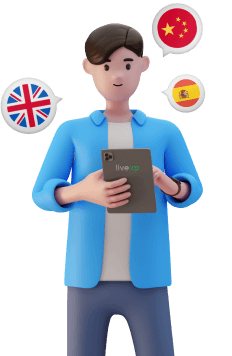
English For Office: How to Help Your Workers Communicate Effectively
Learning any language, even English is a process, and the more you practice the language, the better your chances of learning faster.

Get a FREE guide!
Want to sound like a native English speaker?
Get our free PDF with top tips that work.

Check your email!
Using English in your office is a great way to level the language barrier and ensure that workers can adequately communicate with each other and the organization’s clients in person, over the phone, or via email.
English is identified as a universal language, and this is for no other reason than because it is spoken by over 1.5 billion people in the world, either as the first or second language, making English the most spoken language in the world. This popularity is due to the influence of the British Empire in various parts of the world, their colonial rule, economy, and trade relations with other major nations like the United States of America.
As an international language, it is only expected that English is used in almost all spheres of life. This goes from everyday conversations to being taught in schools, especially in the words used in office communication.
To that effect, this article is a compilation of relevant English phrases to add to your vocabulary to help improve your communication skills in the office.
How to help your office workers speak English professionally
It is essential to know that you can’t master everything about English for the office in one day. Learning any language, even English is a process, and the more you practice the language, the better your chances of learning faster.
The examples in this article are not the ultimate guide to mastering English; signing up for practical classes with LiveXP, reading books, and business-related articles are ideal to help you grow.
LiveXP is an effective language learning platform invested in helping companies train their workers to become fluent in English. LiveXP provides a B2B program for corporate language training which gives full transparency for company managers and flexibility for workers in learning English. Within this program, there are no limits to languages your employees can learn and tutors they can practice with. LiveXP also provides great interactive learning tools for the best results, a convenient dashboard for tracking the progress of your workers, and a personal manager to assist the company with all questions.
So, if you’re looking for the best way to help your employees speak confident business English, give LiveXP a try.
Business English vocabulary: words used in office communication
Meeting and talking to new people in the business space can be worrying, especially if you are afraid you might mess up the meeting and leave a wrong first impression. And if you’re an HR or CEO, you can face this from your employees. To fix that, here are a few English for office workers phrases to learn to make your first meetings much less awkward.
Greetings/exchanging pleasantries
The first thing to do when meeting a person for the time being is to start with a friendly greeting; this eases any tension and allows a flow of conversation. It would be wise to begin with any of the following;
Hello, how are you today?
Good morning/ afternoon/ evening
Make an introduction
After greetings, the next step is to introduce yourself to the new person and have them do the same. An introduction aims to establish a friendly relationship and get to know their names. Here are phrases to use in such office English conversation:
My name is –––, what is yours?
I’m –––, may I know your name?
Afterward, saying “It is nice meeting you” or “It is a pleasure to meet you” is an excellent way to close the greetings, and by then, you should have learned their names and probably exchanged contact cards.
Office English communication: how to start
You should extend your conversation and get to know them better, then continuing by asking a few questions about themselves is an excellent way to start.
Where are you from?
Where and what did you study?
What has it been like working at your current job?
Saying goodbye
Once the small talk is over and it is time to bid the newly made office acquaintances farewell, let them know you were pleased to meet them.
It was very nice to meet you; I’ll see you around.
Take care of yourself
Have a good day
Business phrases in English for phone calls
Picking up the phone and talking to the other person on the line can be a part of your job, but it can become a task you shy away from if you are still learning English. Here are a few easy phrases to learn to improve your business English vocabulary.
Hello/ good day; what can I do for you?
Hello, how can I help you?
Depending on whether the person on the phone is a co-worker or a client, you may or may not need to say your name when you pick up the phone. Saying, “What can I do for you?” is a good way of asking why the caller reached out and how you can help them with their concern in a friendly, professional, and efficient manner.
You would also need to learn phrases like:
May I know your name?
The manager is not available at the moment. Would you like to leave a message?
Could you say that again? I didn’t catch you.
However, using the last phrase might seem tricky because “catch” is a verb used when something is thrown. But in the last example, “catch” is used in the expression to tell about a break in communication and ask the other person to repeat what they have said.
How to end the phone call
You don’t want to end a phone call abruptly; it won’t reflect well on you and the organization. Ending phone calls with co-workers, customers, and clients as politely as possible is necessary. Here are a few phrases to master to achieve this, but you should note that these won’t be appropriate if you end a business discussion.
Thank you for calling
Have a pleasant day
Thank you for reaching out to us
English vocabulary for making small talk in the office
Maintaining a friendly relationship with people in the office is essential, and this can easily be achieved by making small talk. Small talk helps you learn more about your co-workers, creates a comfortable workspace, and allows you to make new friends. It also can be used when talking to your clients.
You don’t want to appear too strong and look awkward, so start with the following.
How are you doing today?
Did you watch last night’s game?
What are your plans for the weekend?
Have you heard about the new series being released?
What football team do you support?
Allow the conversation to flow in as many directions as time allows, and enjoy the time you spend connecting. When it is time to part, say a friendly phrase like
It was great talking to you.
See you around
Have a good day
How to start and end a business conversation
Discussing business in the office cannot be avoided as decisions have to be made and plans set into motion to move the enterprise forward. Learning to communicate effectively and using proper business idioms and phrases will make working with you easy and make your office job much less stressful.
To start a business conversation, first, introduce yourself and state why you arranged for the meeting:
Hello, my name is ----, and I work in HR (or whatever your post or department is). I have called us together to discuss -----, and I hope we can make progress.
If you think it is necessary, make others introduce themselves and ask them to state their names and jobs in the company. Once the introductions are done, you can start the meeting to discuss pending issues or items on your agenda.
After the meeting, you’ll need more than a thank you to appreciate your associate/ client for their time on that call or physical meeting with you, so end the business discussion using the following phrases;
Thank you so much for giving your time today; I look forward to getting started.
I’m glad we could discuss these issues; thank you for your attention
Thank you for coming
Thank you for your contributions and ideas
Let’s call it a day; thank you all for your time and efforts
Business phrases for important deals/ negotiations
English has gained much recognition as an international language, so it is not surprising that it is used in negotiations, especially between business partners speaking different languages. In this situation, English bridges the language gap, and the meetings go smoothly since the parties understand each other.
Here are a few business phrases in English you can use in any necessary negotiation:
We should take a look at our options and reach a consensus
What are your views on the alternatives we have provided?
We think the best thing to do is…
Do you have any reservations you would like to discuss?
How much more resources would you estimate we need?
Business-related idioms to use in the office
The English language uses many idioms, and these idioms find their way into the business sector. The idiomatic expressions are not translated easily as they often mean something different. Take a look at some idioms you might hear in the office and their meaning:
Steep learning curve: is challenging to learn or requires much effort.
Think outside the box: to develop original and creative concepts or solutions.
Hit the ground running: starting a project with ample energy.
Cornering the market: to dominate.
Call the shot: to give orders or make important decisions.
















